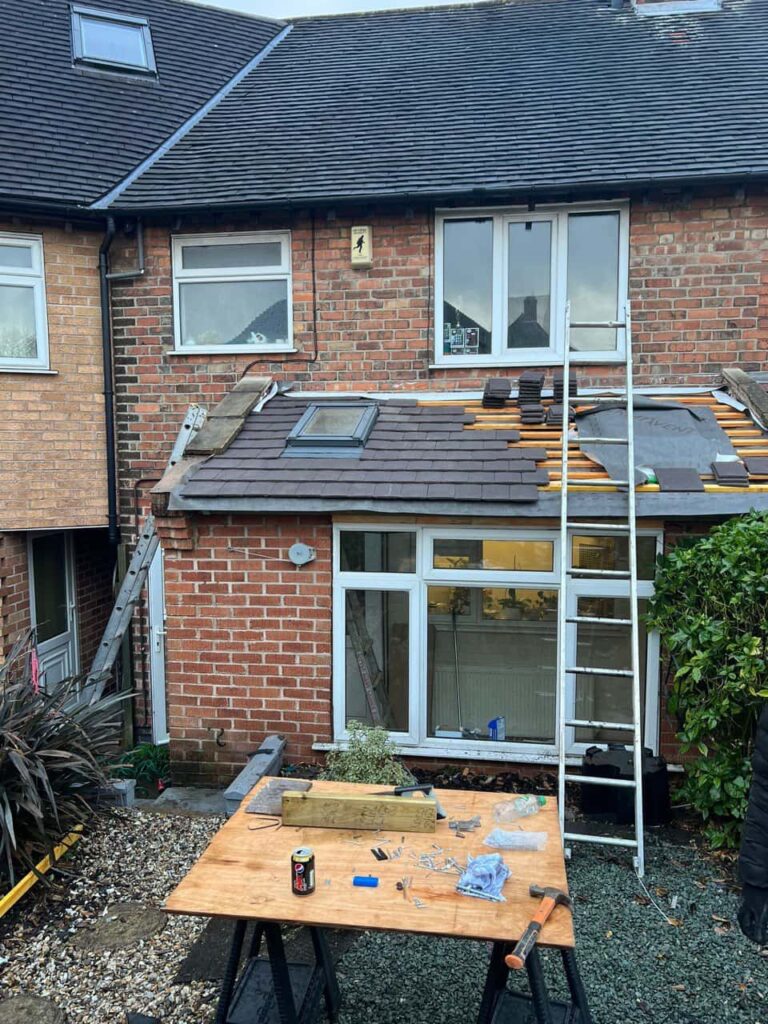A pitched roof is designed to withstand harsh weather conditions, but without the right reinforcements, it can still be vulnerable to high winds, heavy rain, and hail. Homeowners in Glenfield, Leicestershire, can take several steps to enhance their roof’s durability and minimise storm damage. At Glenfield Roofing Repairs, we specialise in storm-proofing roofs to ensure long-term resilience.
Assessing Your Roof’s Current Condition
1. Conducting a Roof Inspection
Before making upgrades, it’s essential to assess the current condition of your roof. Look for:
- Missing, cracked, or loose tiles
- Signs of water ingress, such as damp patches or mould
- Damaged or clogged gutters
- Weak flashing around chimneys and vents
A professional inspection will identify areas that need immediate attention and highlight opportunities for strengthening your roof.
Essential Upgrades for Storm Protection
2. Reinforcing Roof Tiles and Shingles
High winds can lift and dislodge roof tiles, leaving your home exposed to water damage. To prevent this:
- Use storm-resistant roofing materials, such as interlocking tiles or metal sheets
- Apply roofing adhesive to secure existing tiles
- Ensure proper overlapping and fastening for added durability
Replacing old, brittle tiles with impact-resistant materials can significantly reduce storm damage.
3. Strengthening Roof Flashing
Flashing is essential for sealing joints and preventing water leaks, particularly around:
- Chimneys
- Skylights
- Roof valleys
To reinforce flashing:
- Use lead or high-grade aluminium flashing for maximum durability
- Ensure proper sealing with weatherproof adhesives
- Replace any worn or corroded sections before they fail
4. Improving Guttering and Drainage
A well-maintained drainage system helps direct rainwater away from the roof and prevents leaks.
- Install larger capacity gutters to handle heavy rainfall
- Use gutter guards to prevent debris build-up
- Ensure downpipes direct water away from the foundation
Clearing gutters regularly is crucial to maintaining effective water drainage during storms.
5. Upgrading Roof Battens and Underlayment
The structural integrity of a pitched roof relies on strong battens and underlayment.
- Treated timber battens offer extra strength against wind uplift
- Breathable underlayment prevents moisture build-up while adding an extra waterproofing layer
- Consider synthetic membranes for enhanced durability
These upgrades provide additional stability and extend the lifespan of your roof.
Additional Protective Measures
6. Installing Roof Bracing for Added Stability
In areas prone to high winds, roof bracing can prevent structural failure.
- Truss bracing reinforces the internal structure
- Hurricane straps secure the roof to the walls of the property
- Plywood sheathing adds an extra layer of strength
These measures are particularly useful for older properties with ageing roof structures.
7. Applying Protective Coatings
Protective coatings help waterproof your roof and improve its resistance to extreme weather.
- Sealants prevent water penetration into tiles and flashing
- Reflective coatings reduce heat damage and UV exposure
- Bitumen-based solutions enhance durability on flat sections or edges
Applying a high-quality coating can add years to your roof’s life and minimise maintenance needs.
Conclusion
Upgrading a pitched roof for maximum storm protection involves reinforcing weak points, using durable materials, and improving drainage systems. These measures not only safeguard your home but also reduce long-term repair costs. At Glenfield Roofing Repairs, we provide expert roofing services in Glenfield, Leicestershire, ensuring your home remains protected in all weather conditions. Contact us today for a professional roof assessment and upgrade.
Call us on: 0116 502 2198
Click here to find out more about Glenfield Roofing Repairs
Click here to complete our contact form and see how we can help with your roofing needs.

